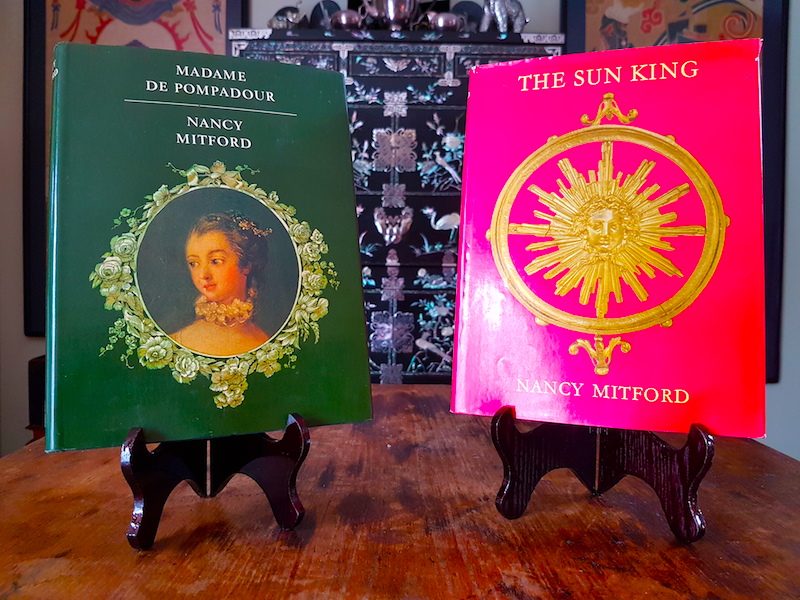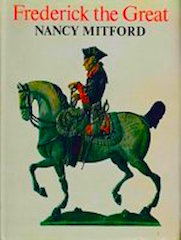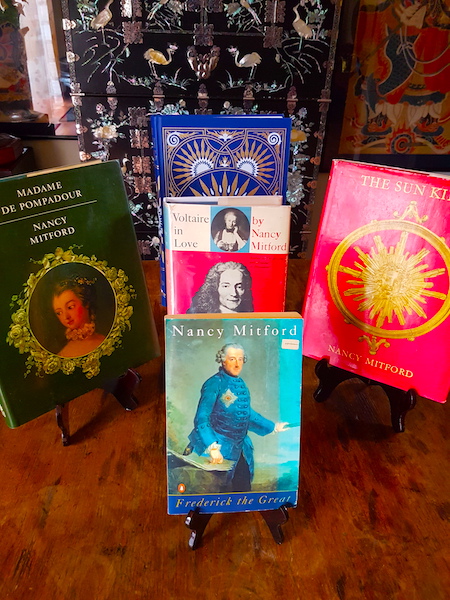At last! It’s taken decades, but my Mitford collection is now complete. I’m referring to Nancy Mitford’s 4 historical biographies, rather than her novels. In order of publication, the biographies are: Madame de Pompadour (1954), Voltaire in Love (1957), The Sun King (1966), and Frederick the Great (1970).
Attentive readers might remember this photo from an early post on this blog:

Madame de Pompadour and The Sun King, both by Nancy Mitford. These are the lavish American editions published by Harper & Row.
At the time, these were the only items in my Mitford collection. They’ve followed me from home to home through 4 countries over the last 30-odd years, which is why the dust jackets are slightly the worse for wear. I had once owned a hard cover copy of Frederick the Great, but I donated it to a library that one of my former professors was setting up at Western University (my alma mater, formerly known as the University of Western Ontario). It’s called the Pride Library. You can visit its website here: http://www.uwo.ca/pridelib/.

Frederick the Great by Nancy Mitford. Credit: Wikipedia.
I still covet another hard cover copy of it, preferably the edition pictured above, but I did recently have the luck to find a Penguin paperback reprint at my local antiquarian and secondhand bookstore, Condor Fine Books. (Visit their website here: http://www.condorfinebooks.ca.)
It was ultimately through a private seller via Amazon that I was finally able to purchase the only book in the collection that I had never owned, that in fact I’d never even seen in any shop in any country that I’ve lived in or visited, namely Voltaire in Love. Below is a photo of my now complete Mitford collection with Voltaire in Love in the centre. The beautifully bound book at the back is a recent re-issue of The Sun King by the Folio Society.

My complete collection of Nancy Mitford’s historical biographies.
I’ve placed Voltaire in Love in the centre because it’s the rarest of the group. As far as I know, it’s the only one that’s never been reprinted. This is odd because it’s the book that really established Mitford as a historical biographer. Madame de Pompadour was published first, it’s true, but it wasn’t so well received. One reviewer complained that it was like reading history as overheard gossip at a cocktail party. When Voltaire in Love came out, Mitford’s sparkling, conversational prose style began to appreciated, and by the time The Sun King appeared, her style was praised as ideal for narrative history.
Academic historians may sneer at these works of popular history by a former novelist — as they have done, and do — but Mitford’s knowledge of the period has proved to be unassailable. Although not a trained professional historian, she was francophile to the bone, perfectly fluent in French, the lingua franca of all her subjects, and read all the relevant contemporary memoirs and letters in the original, the gleanings of which she then used her novelist’s skill to weave together in an absorbing narrative. As I pointed out in a previous post, her other great advantage over academic historians was her background. A peer’s daughter who had been presented at court, she had an instinctive understanding of the milieu in which her subjects lived.
My own favourite of the Mitford collection is Frederick the Great, not only because the Philosopher of Sans Souci is my favourite historical character, but because the book is a fitting capstone to Mitford’s biographical career. Madame de Pompadour, Voltaire, Emilie du Châtelet (the other main character in Voltaire in Love), and Frederick the Great were contemporaries and all corresponded with one another. Voltaire, in fact, went to Berlin after Mme du Châtelet’s death and lived with Frederick for a time. Frederick the Great ties all the threads together, so to speak.
Have you read any of the Mitford collection? Which was your favourite? Let me know in the comments below, on the Versailles Century Facebook page, or in the Versailles Century gallery on Instagram.


















I recently finished The Sun King, and enjoyed it enormously. I now have a better feel for the life and the people of that time than I have ever had. Reading it was indeed sometimes like eavesdropping on conversations, but that is exactly what made the experience so telling. Also, there were no distracting footnotes to disturb my absorption in the moment. I then took from my bookshelves some long-neglected books, including letters of the formidable salon ladies of the 17th and 18th centuries, and there I read the same conversations, the same comments. Nancy Mitford’s reporting of letters and conversations were almost word for word, yet this never got in the way of the marvelous flow of her prose.
It seemed that the greatest sin at the court of Louis XIV was being boring – far worse than murder and intrigue and poisoning. I then read Voltaire in Love, and saw the same thing. Voltaire’s enjoyment of intellectual exchange with Mme de Chatelet was central to his love for her. Both needed stimulation: “Like all those who live in the country, Voltaire and Mme du Chatelet greatly depended on the postbag.” The “boredom of Cirey was the greatest of all boredoms.”
Mitford admires the style of Voltaire in his Siecle de Louis XIV, “written in the laconic, witty style which was to be borrowed with such effect by Lytton Strachey”. And by Nancy Mitford herself, surely? “He [Voltaire] loved to illustrate his writings with anecdotes”. Again, doesn’t Mitford? Her own comments are often so understated that they are easy to miss: “There was something Byronic about him [Saint-Lambert], and like Lord Byron he was a poet, though not so talented. He wrote about nature and the countryside.”
I now look forward to finding a copy of Frederick the Great, and another wonderful read.
Thank you so much for your comment. I like how you put it: you now have a better “feel” for the people and the times. No academic historian could do what Mitford did with these biographies. I agree that her prose has the sparkle of Voltaire’s. His style was clearly a major influence on her writing.
Frederick the Great is my favourite of the biographies. It had a profound influence on me, as you may have read in one of the early posts of this blog. You have much to look forward to!